8 Things to Know Before Getting a Pet Rabbit, According to Experts
They may be small, but taking care of them is a big deal.
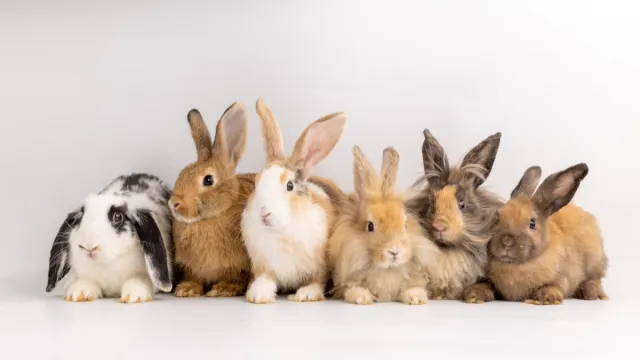
Pet rabbit owners often say that their lives were forever changed when a cotton-tailed friend or two hopped into their hearts. If you arm yourself with the right information, bunnies can be some of the best pets you'll ever have the pleasure of sharing your life with. They're affectionate and smart; they can be litter trained; they're clean, quiet, curious, and, of course, ridiculously cute. But rabbits aren't quite as low-maintenance as many assume. To learn what's required to keep a house rabbit happy, read on to hear from veterinarians and animal experts. As long as you plan ahead and do your research, you'll be on the bunny trail to a very satisfying relationship.
READ THIS NEXT: 5 Low-Maintenance Dogs You Barely Need to Walk.
1
Rabbits are not kid-friendly.
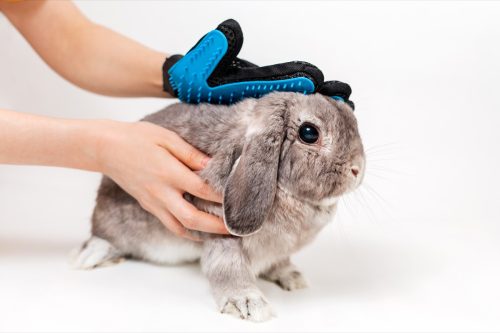
Rabbits are delicate creatures both physically and emotionally, so they don't make the best first pets for young children. Even older kids may get bored with rabbit care duties and details, so be sure an adult is ultimately responsible.
"The stereotype is that rabbits make excellent pets for children; unfortunately this just isn't the case. Of course, children love bunnies, but rabbits aren't ever thrilled to be looked after by small children. Loud noises and sudden movements can easily startle and frighten rabbits," explains Daniel Jackson, animal behavioral and nutritional specialist and CEO of Pet Lover Guy.
2
Rabbits cannot be kept outside.
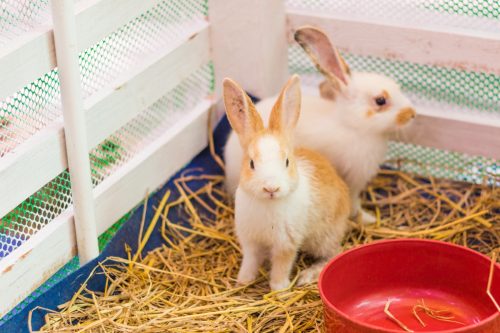
Contrary to what you may have heard, you can't keep a house rabbit in an outside pen or hutch, even a large one, for two reasons. First, domestic rabbits don't tolerate cold or wet weather well. More importantly, rabbits kept in an outdoor enclosure are very likely to be stalked by predators, including stray cats, foxes, raccoons, birds of prey, and snakes. Even if these predators can't get into the enclosure, seeing them from the outside can easily terrify your pet. According to The Bunny Lady, keeping a pet rabbit outside can reduce their lifespan from 10 years to just five to seven years.
READ THIS NEXT: The No. 1 Reason You Shouldn't Get a Pet Hamster.
3
Rabbits need room to roam.
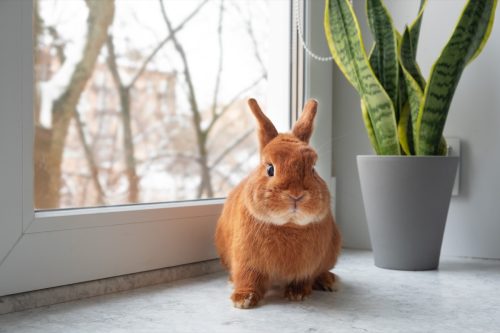
Ideally, rabbits should have the (supervised) run of the house for exercise for at least two to four hours each day, in a designated and enclosed area. Outside of this time, you also want to make sure your rabbit's home is as spacious as possible.
"For the happiness and health of your rabbit, he needs to have as much room as possible to run and play in given your particular living circumstances, including the biggest, roomiest cage or habitat you can manage," a veterinarian tells Best Life. "Most cages marketed for rabbits that you find in pet stores are simply too small to adequately house a rabbit, especially if you find it necessary to keep him in the cage for much of the day, so you need to seriously look into alternatives such as do-it-yourself habitats constructed from office-storage grid cubes (which a lot of house-rabbit people swear by)."
Rabbits need their privacy, too. If you have more than one, each must have a minimum amount of square feet to themselves in their home pen, even if they are a bonded pair.
4
Your home should be bunny-proofed.
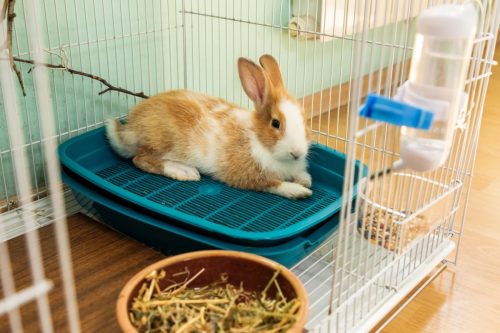
Rabbits will chew anything and everything they find, which can be dangerous to them and damaging to your home. In the space that's designated as their home base, get electrical cords out of the way, and cover moldings, furniture legs, and basically anything you don't want to be chewed. While they're out and about, they should be supervised, and anything really dangerous should be moved out of harm's way.
In a video about how to bunny-proof your home, Lorelei Carlson, bunny expert and human mom to the famous Lennon the Bunny, offers several cheap and easy ways to protect your bunny zone:
- Put shipping tape and corner guards around baseboard corners
- Wrap wall corners and baseboards with shelving grids
- Try bitter apple spray on items you don't want your bunny chewing
- Put toxic plants out of reach
- Wrap phone and other electronics cords in flex tubing, wire covers–or just a regular garden hose
For more pet content delivered straight to your inbox, sign up for our daily newsletter.
5
An expert vet and spaying/neutering are musts.
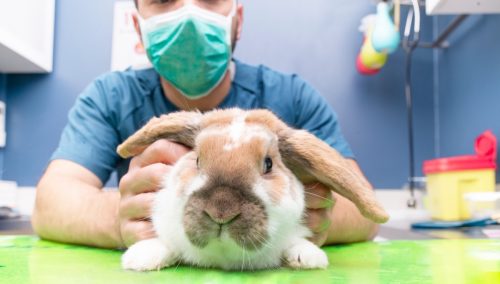
"It's important to find a vet who's been trained in and has experience with rabbit medical care. This can be more expensive than vet care for dogs and cats because rabbits are classified as 'exotic' animals," says Takaguchi.
And don't delay in finding this vet, as house rabbits should be neutered or spayed early on, especially if you're going to bond a rabbit to another bunny. In addition to health reasons (up to 80 percent of female rabbits will develop uterine cancer if not spayed) the House Rabbit Society explains that "spaying or neutering your rabbit improves litterbox habits, lessens chewing behavior, decreases territorial aggression, and gives your rabbit a happier, longer life." They suggested having your rabbit neutered between ages four to six months.
6
Rabbits do best when they have a buddy.
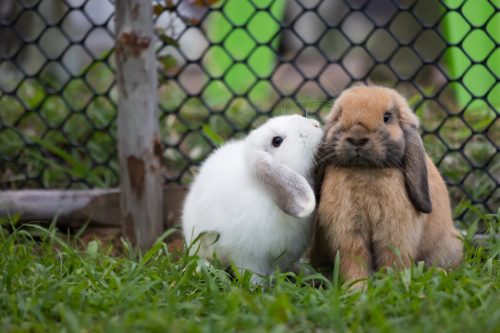
House rabbits thrive in bonded pairs. "Rabbits enjoy being with other rabbits and should never be kept as solitary pets," according to Jackson. "Your rabbit will be a lot less anxious and a lot more social with another bunny around."
However, they don't get along with every bunny. It's a good idea to try out potential housemates with "play dates" on the premises of the shelter or breeder. While it's not 100 percent necessary to get your bun a buddy, it's a lot more important that you spend quality time with them if they're on their own to avoid boredom and depression.
READ THIS NEXT: 6 Reptiles That Make Great Pets, According to Experts.
7
Rabbits require a lot of attention and patience.
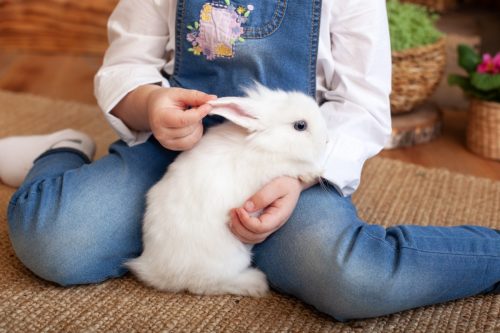
Sometimes new rabbit owners are initially disappointed that their bunnies aren't as sweet and cuddly as they look. The reality is, rabbits are very sensitive and intuitive creatures. Getting close requires patience.
Many rabbits don't like to be picked up. As prey animals, the idea of being lifted off the ground may startle and stress them. Sit or lie down on the floor—on their level. Spend lots of time talking to and interacting with your new pet, waiting for them to approach you so they feel safe. Treats help, too, though these should not supplant their regular diet.
And be aware that how they show affection may not be what you expect at first. "They are very smart animals with a very complex language based chiefly on body postures that they use to communicate deep, subtle shadings of emotion," explains a veterinarian. "For example, a bunny will often nip you as a way of communication. Nipping is not aggression or meanness, it's communication."
8
Pay close attention to dietary requirements.
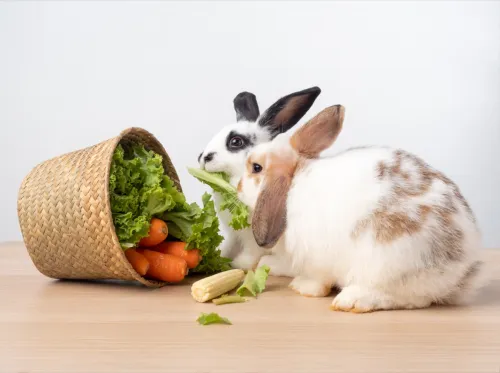
The foods often associated with rabbits are actually high in sugar. A carrot for an occasional treat is fine but will cause problems as an everyday snack. "Rabbit bellies are very delicate, and too much of anything outside their regular diet can send them into GI stasis," Carlson stresses.
Rabbits need a specific herbivore diet consisting mostly of fresh grass hay, especially timothy hay, which should make up at least 75 percent of their daily diet, along with fresh leafy dark green veggies and lots of clean, fresh water to drink.





















